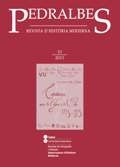Les conseqüències de la Guerra de Successió: nous imposts a la Corona d’Aragó, una penalització o un futur impuls per al creixement econòmic?
Keywords:
fiscal policy, public finances, War of Succession, Philip V, Valencia, Catalonia, Aragon, Majorca.Abstract
Once the War of Succession for the Spanish Crown was over, Philip V decided to get more resources for the Exchequer with the establishment of new taxes in the ancient kingdoms of the Crown of Aragon. These were expected to be the equivalent of the amount that he would have obtained if he had demanded them according to current taxes in the Crown of Castile. The new tax system was introduced only in the territories that had chosen the austracismo side during the War of Succession. So, its introduction must be interpreted as a penalty for those who rebelled against the new Bourbon king. These new taxes were novel in that for the first time direct taxes were imposed on the properties of the taxpayers, their income from work, and also their trading profits. The taxes were introduced at the same time as a territorial quota system which ensured a regular income for the State. Far from taxes being levied according to each individual’s wealth, they depended on the amount that Royal Treasury wished to collect from each territory. Nevertheless, although the new tax was burdensome, its subsequent freezing for over a hundred years did not prevent economic growth in these area.
Downloads
Published
How to Cite
Issue
Section
License
Copyright (c) 2013 Josep Juan Vidal

This work is licensed under a Creative Commons Attribution-ShareAlike 4.0 International License.
Authors must agree with the following terms:
1. The author keeps authorship rights, ceding the journal the right to first publication.
2. Texts will be disseminated with a Creative Commons Attribution 4.0 International License. Which allows for the work to be shared with third parties, as long as they recognise the work’s authorship, the original publication in the journal and licensing conditions.
This requires acknowledging authorship appropriately, providing a link to the license, and indicating if any changes have been made. It can be indicated in any reasonable way, but not in a manner that suggests the licensor endorses or sponsors the use of the text.
If content is remixed, transformed, or new content is created from the journal's texts, it must be distributed under the same license as the original text



